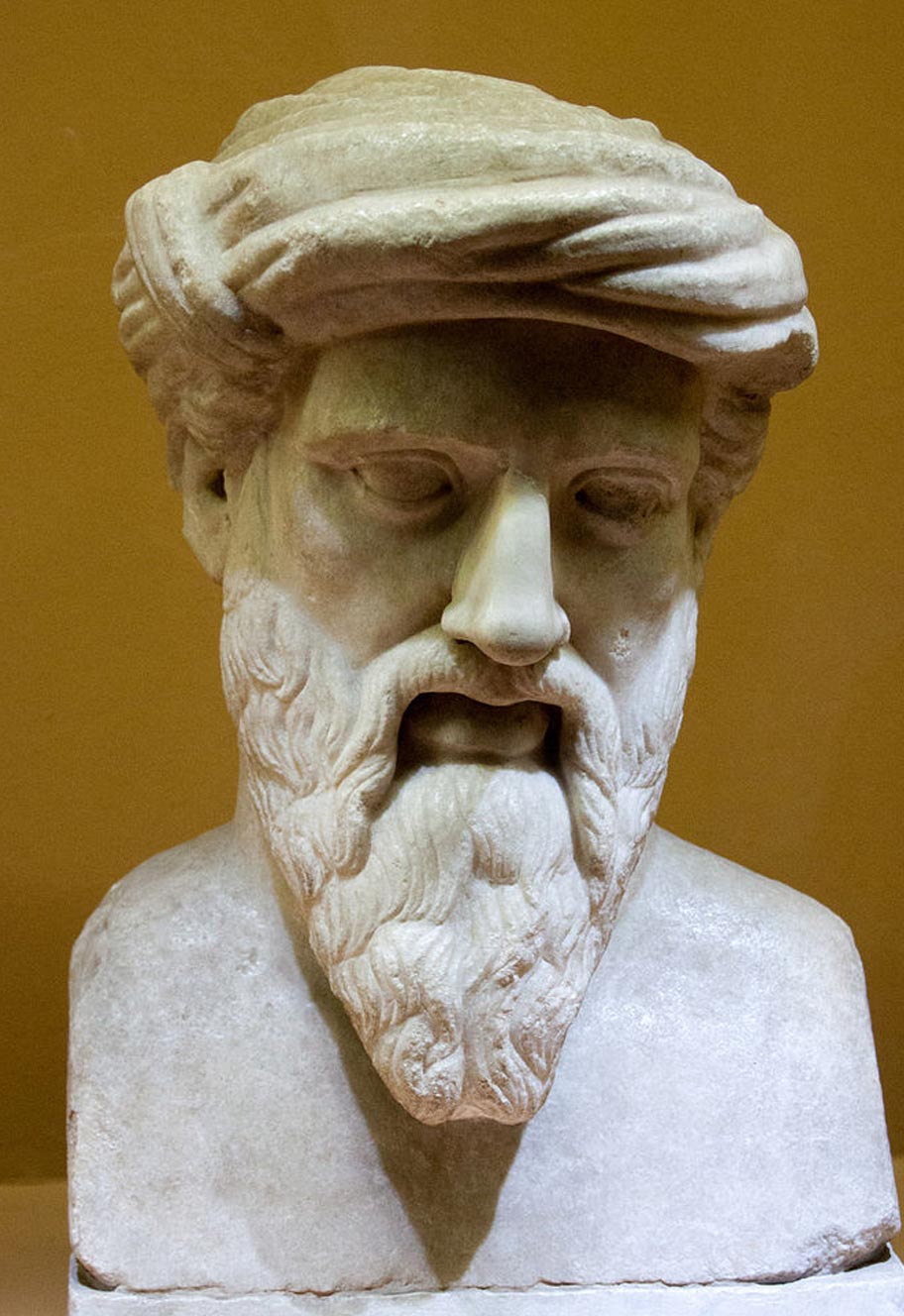Pythagoras
Born:
C. 570–495 BCE
Died:
Exact details not well-documented
Pythagoras of Samos was an ancient Greek philosopher and mathematician who founded the Pythagoreanism movement. Born around 570 BCE, he is best known for the Pythagorean theorem, but his contributions extend far beyond mathematics, encompassing philosophy, religion, and science.
Early Life: Pythagoras was born on the island of Samos in the Aegean Sea. He traveled extensively in his youth, visiting Egypt, Babylon, and possibly India, where he was influenced by various mathematical and religious teachings. Eventually, he settled in Croton (modern-day Crotone, Italy), where he founded his philosophical and religious school.
Philosophical and Mathematical Contributions: Pythagoras is most famously associated with the Pythagorean theorem in mathematics, which states that in a right-angled triangle, the square of the hypotenuse is equal to the sum of the squares of the other two sides. However, his contributions to mathematics also include the development of number theory, the concept of numerical ratios, and the idea that numbers are the fundamental reality of the universe.
Religious and Ethical Teachings: Pythagoras's teachings extended into the realm of religion and ethics. He believed in the immortality and reincarnation of the soul, and his followers adhered to a strict code of conduct, including dietary restrictions and communal living. The Pythagorean way of life was characterized by a commitment to purity, both in thought and in deed.
Influence on Music and Cosmology: Pythagoras discovered that musical intervals could be expressed in simple numerical ratios, laying the groundwork for the study of musical harmony. He also proposed that the planets and stars moved according to mathematical equations, producing a cosmic harmony, known as the "music of the spheres."
Legacy and Impact: Pythagoras's influence extended far beyond his own time. His ideas about the interconnection of mathematics, music, and the cosmos inspired subsequent philosophers, including Plato and Aristotle. The Pythagorean emphasis on rationality and order contributed significantly to the development of Western philosophy and science.
Death and Epitaph: Pythagoras's death is shrouded in mystery, with various accounts suggesting he died either in Croton or Metapontum around 495 BCE. His epitaph might reflect his multifaceted contributions: "Pythagoras of Samos, seeker of harmony, revealer of the order of the universe, here rests. His numbers sang the secrets of the cosmos, his life embodied the quest for knowledge."

Quick Facts
- Pythagoras is best known for the Pythagorean theorem, a fundamental principle in mathematics.
- He founded a philosophical and religious school that emphasized the interconnection of mathematics, music, and the cosmos.
- Pythagoras's ideas about numerical ratios influenced the study of musical harmony and cosmology.
Further Reading
Art &
Architecture
Ancient Greek art and architecture, with its harmonious proportions and timeless elegance, continue to inspire awe and admiration millennia later.
Discover
Greek Mythology & Mythical Characters
Greek mythology, a rich tapestry of gods, heroes, and mythical creatures, captivates the imagination with its tales of love, betrayal, and epic adventures that delve into the depths of the human psyche.
Discover
Ancient Greek History
Ancient Greek history, marked by remarkable achievements in democracy, philosophy, and warfare, shaped the foundation of Western civilization, leaving an indelible legacy of innovation and cultural influence that continues to resonate to this day.
Discover
Ancient Greek Olympics
The ancient Greek Olympics, held in Olympia every four years, celebrated athleticism, unity, and cultural pride, serving as a testament to the enduring spirit of competition and excellence that transcends time and borders.
Discover
Ancient Greek Wars
Ancient Greek wars, such as the Persian Wars and the Peloponnesian War, were pivotal conflicts that shaped the course of history, highlighting the struggle for power, independence, and the clash of civilizations in the ancient Mediterranean world.
Discover
Ancient Greek Culture and Society
Ancient Greek culture and society, characterized by its emphasis on art, philosophy, and civic engagement, fostered a vibrant intellectual and social landscape where innovation flourished, democracy thrived, and the pursuit of knowledge and excellence was celebrated as fundamental values of civilized life.
Discover